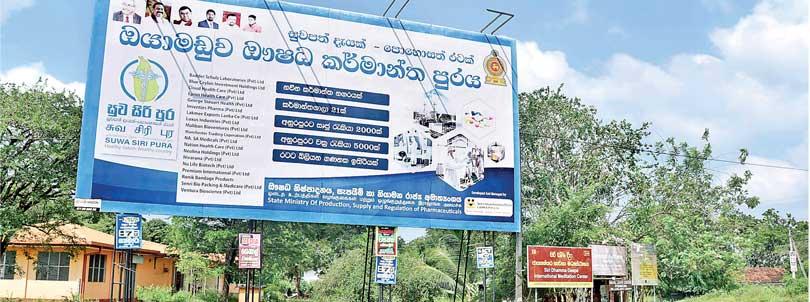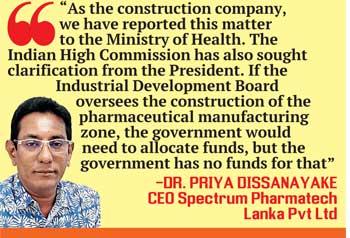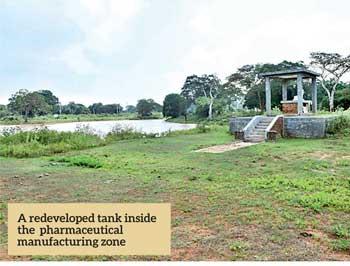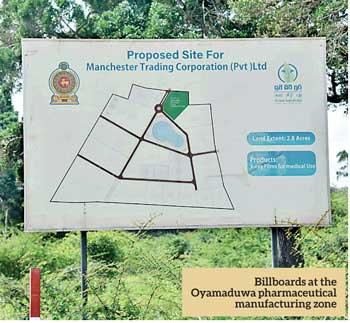Reply To:
Name - Reply Comment
Last Updated : 2024-05-04 16:32:00

A large billboard giving details of the Oyamaduwa pharmaceutical manufacturing zone
 Twenty one companies within the Oyamaduwa pharmaceutical manufacturing zone received approval from the Ministry of Health. The government does not allocate funds for the establishment of these factories; instead, the participating companies are required to cover the costs associated with this venture. An Indian company and its subsidiary, Spectrum Pharma TECH Lanka Pvt Ltd in Sri Lanka, were chosen to construct these factories through a tender process. Eighty percent of the project will be developed by the Indian company, with the remaining 20 percent by the local representative company, Spectrum Pharmatech Lanka Pvt. Tenders were submitted from three institutions and 35 factories for constructions in this manufacturing zone. 21 pharmaceutical manufacturing companies were selected for the initial phase.
Twenty one companies within the Oyamaduwa pharmaceutical manufacturing zone received approval from the Ministry of Health. The government does not allocate funds for the establishment of these factories; instead, the participating companies are required to cover the costs associated with this venture. An Indian company and its subsidiary, Spectrum Pharma TECH Lanka Pvt Ltd in Sri Lanka, were chosen to construct these factories through a tender process. Eighty percent of the project will be developed by the Indian company, with the remaining 20 percent by the local representative company, Spectrum Pharmatech Lanka Pvt. Tenders were submitted from three institutions and 35 factories for constructions in this manufacturing zone. 21 pharmaceutical manufacturing companies were selected for the initial phase.
The local company affiliated to the Indian company was granted permission to oversee and provide the infrastructure necessary for establishing the manufacturing zone; collaborating with relevant construction companies under a 35-year contract. In this arrangement, each respective company is required to establish factories on their designated land. It is the duty of the local company, associating with the Indian company, to secure funds from the relevant companies and manage these tasks.
 The manufacturing zone is expected to generate 2000 direct jobs and 5000 indirect jobs. The estimated cost for establishing this manufacturing zone is 130 million dollars, and plans have been formulated for its construction on an 80-acre land. None of the pharmaceutical products manufactured in this manufacturing zone will be transported to Colombo; instead distribution is planned in such a way to cover the rest of Sri Lanka and will be done from the Oyamaduwa Manufacturing Zone. Plans were devised to carry out quality control of medicines, distribute pharmaceutical products and construct a laboratory with all the essential facilities on the designated land.
The manufacturing zone is expected to generate 2000 direct jobs and 5000 indirect jobs. The estimated cost for establishing this manufacturing zone is 130 million dollars, and plans have been formulated for its construction on an 80-acre land. None of the pharmaceutical products manufactured in this manufacturing zone will be transported to Colombo; instead distribution is planned in such a way to cover the rest of Sri Lanka and will be done from the Oyamaduwa Manufacturing Zone. Plans were devised to carry out quality control of medicines, distribute pharmaceutical products and construct a laboratory with all the essential facilities on the designated land.
No illegal activities have been reported of during the construction phase of the manufacturing zone. Approximately 28 trees were felled in the area during road preparation phase. Spectrum Pharmatech Lanka Pvt Ltd Chief Executive Officer Dr. Priya Dissanayake informed this newspaper that the timber was handed over to the State Timber Corporation and the revenue generated was remitted to the government. Several factors, including the appreciation of the dollar have contributed to delays in the construction of the manufacturing zone. During the planning phase, the dollar exchange rate was 196 rupees. Dr. Dissanayake mentioned that the Ministry of Health granted permission to recover the costs of the manufacturing zone from the manufacturers based on that exchange rate.
The construction of this manufacturing zone does not create any environmental damage. Factories are categorised as non-harmful, mildly harmful and harmful and this is done with the aim of minimising the impact on the environment. And plans to commence these factories were formulated considering the allocated investments for each category. Dr. Dissanayake said that these plans were developed following an audit and cost calculation.
As of now, eight selected companies have received approval for tax payments. This is a project that comes under the Ministry of Health. Despite that, according to Dr. Dissanayake, considerations have been made to relocate the Pharmaceutical Manufacturing Zone from Oyamadu to Koggala through the Industrial Development Board. Additionally, he mentioned that former Health Minister Keheliya Rambukwella, had entered into an agreement with 12 companies to initiate this manufacturing zone in Oyamaduwa itself.
However, there are plans now to relocate the manufacturing zone to Koggala; leading to heightened skepticism among potential investors and raising concerns about the accountability regarding their investments, Dr. Priya Dissanayake added.
“The project was continually subject to delay and when inquiries were made former Health Minister Keheliya Rambukwella said that the Health Ministry would purchase all medicines produced by the factories involved in this venture. We sought a letter of confirmation for this commitment and a buyback agreement was provided as a guarantee. The agreement is valid for the first five years and can be extended for an additional five years, in line with the operational methodology of the factories,” Dr. Dissanayake added.
“With the surge in the value of the dollar, we communicated the corresponding price increases to the Ministry of Health and established new pricing. However, not all investors were willing to accept these changes. As the value of the dollar rose from 190 rupees to 320 rupees, the construction of the manufacturing zone became unthinkable within the initially planned budget. When we proposed new prices, some investors resisted urging adherence to the previous pricing structure. As we cannot commence factories while obtaining raw materials at the old prices, I investigated the reason behind their strong reluctance to agree to new price rates.
“Then we learned that some companies- profiting from large-scale drug imports- obtained land from this manufacturing zone under the guise of making an investment with the intention of delaying its commencement. Others purchased land without establishing factories; subsequently selling the land to different companies and causing delays in setting up the factory. They requested an acre of land for pharmaceutical production, although this amount is insufficient to build a pharmaceutical company; at least 3 acres are required. These investors are selected by the Ministry of Health and those who make choices may lack knowledge about the infrastructure needed to establish a pharmaceutical company. Therefore, some individuals who acquired land may have sold it to external companies,” said Dr. Dissanayake.
Investors face significant challenges
Others reserve land for setting up factories, but fail to follow through with the construction process. They secure land, claiming they intend to manufacture medicine that would otherwise be imported; yet no factory is built. By postponing their plans, they ensure the continued importation of foreign-made medicine, thus preventing its local production in Sri Lanka, emphasised Dr. Dissanayake. These underhand activities make it necessary to continue with the ongoing import of medicine.
 Out of the 21 investors who initially expressed interest in constructing the Oyamaduwa Pharmaceutical Manufacturing Zone, only 12 proceeded to sign contracts. The remaining investors have abandoned their investment plans. Among the 12, eight are prepared to halt progress by feigning intentions to build the manufacturing zone, with only four genuinely attempting to establish companies. Some of the aforementioned eight companies, accused of hindering development, have issued dishonoured cheques. Dr. Dissanayaka said, “Others claimed to use their contractors instead of making consultations with our company and the Indian company. Their contractors provided extremely low prices”. The Ministry of Health was asked to consider these prices. Dr. Dissanayake further stated that such contracting companies are unregistered and the quoted prices are unacceptable; this is a point acknowledged by the Health Ministry.
Out of the 21 investors who initially expressed interest in constructing the Oyamaduwa Pharmaceutical Manufacturing Zone, only 12 proceeded to sign contracts. The remaining investors have abandoned their investment plans. Among the 12, eight are prepared to halt progress by feigning intentions to build the manufacturing zone, with only four genuinely attempting to establish companies. Some of the aforementioned eight companies, accused of hindering development, have issued dishonoured cheques. Dr. Dissanayaka said, “Others claimed to use their contractors instead of making consultations with our company and the Indian company. Their contractors provided extremely low prices”. The Ministry of Health was asked to consider these prices. Dr. Dissanayake further stated that such contracting companies are unregistered and the quoted prices are unacceptable; this is a point acknowledged by the Health Ministry.
These individuals have employed various tactics to impede the construction of factories and this has resulted in changes to initial plans. They continue to create numerous obstacles, hindering the progress of the pharmaceutical zone. Currently, there is an attempt to relocate this manufacturing zone to Koggala through the Industrial Development Board. Companies that have already invested in Oyamaduwa face significant challenges due to these disruptions. If it is relocated to Koggala and Oyamaduwa zone is stalled, reinvesting becomes impractical. Additionally, obtaining new environmental reports and other approvals could take another 2-3 years; which could then lead to a potential halt in the project. Dr. Dissanayake said that prospective investors in the manufacturing zone are now hesitant due to the uncertainties associated with the project.
“As the construction company, we have reported this matter to the Ministry of Health. The Indian High Commission has also sought clarification from the President. If the Industrial  Development Board oversees the construction of the pharmaceutical manufacturing zone, the government would need to allocate funds, but the government has no funds for that. Moreover, all the previously conducted tender procedures would be nullified; necessitating the initiation of a new tender process. This could potentially lead to the entire zone not being constructed. In such a scenario, it would be considered a victory for the efforts of the drug mafia,” said Dr. Dissanayake adding that they are currently awaiting the President’s decision regarding this matter.
Development Board oversees the construction of the pharmaceutical manufacturing zone, the government would need to allocate funds, but the government has no funds for that. Moreover, all the previously conducted tender procedures would be nullified; necessitating the initiation of a new tender process. This could potentially lead to the entire zone not being constructed. In such a scenario, it would be considered a victory for the efforts of the drug mafia,” said Dr. Dissanayake adding that they are currently awaiting the President’s decision regarding this matter.


Add comment
Comments will be edited (grammar, spelling and slang) and authorized at the discretion of Daily Mirror online. The website also has the right not to publish selected comments.
Reply To:
Name - Reply Comment
US authorities are currently reviewing the manifest of every cargo aboard MV
On March 26, a couple arriving from Thailand was arrested with 88 live animal
According to villagers from Naula-Moragolla out of 105 families 80 can afford
Is the situation in Sri Lanka so grim that locals harbour hope that they coul

03 May 2024